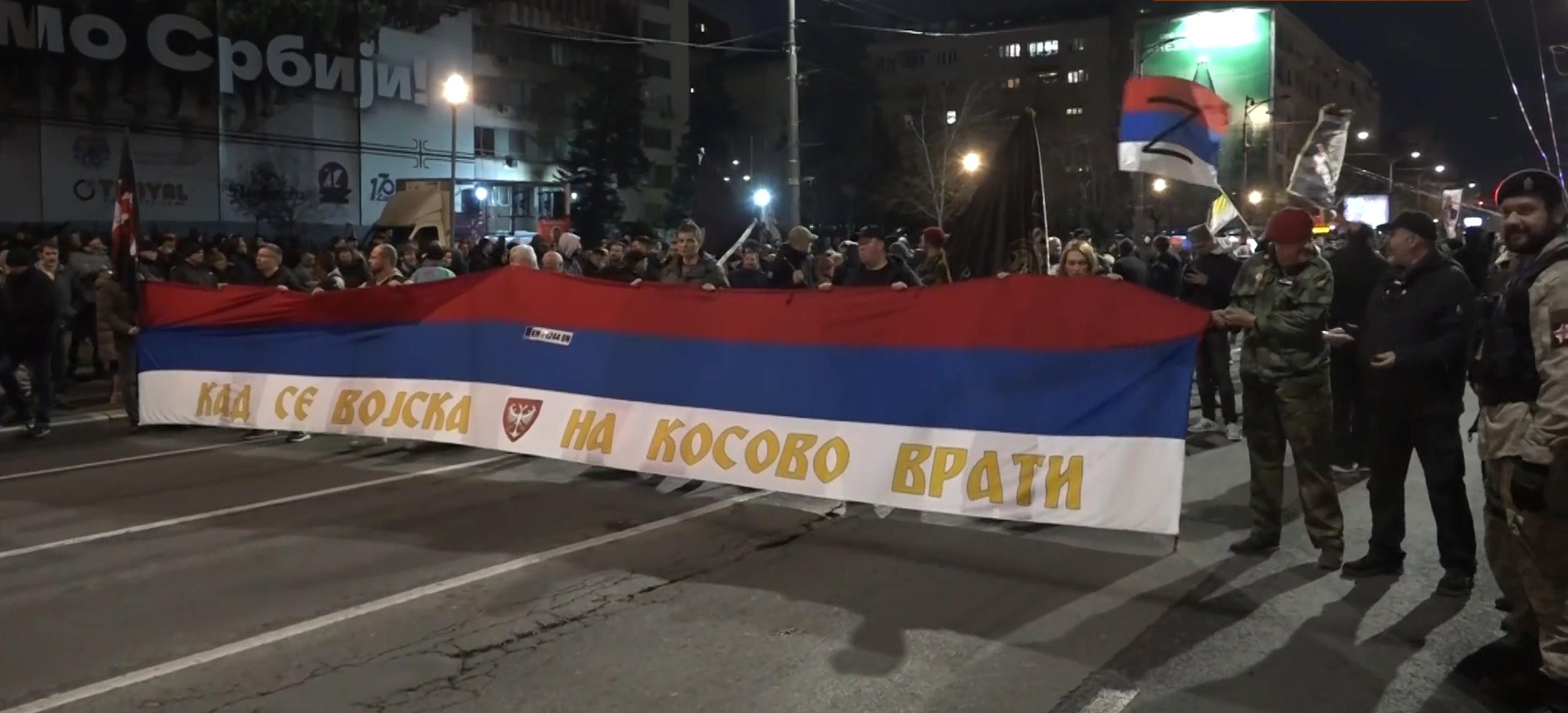Belgrade and Priština responds differently to this question in the title. While Serbian officials claim that they are doing everything to keep the peace, Kosovo’s leaders keep warning of Serbian preparations for war.
It would seem that the international community has done everything to make the “unfreezing” of the conflict in Kosovo impossible. There are the UN administrative mission, NATO-led peacekeeping mission (KFOR), the European Union Rule of Law Mission in Kosovo (EULEX), as well as a dialogue under the auspices of the European Union, which resulted in a number of bilateral agreements, which should contribute to the normalization of relations between Belgrade and Priština. However, the problem of the emergence of a new hot spot in Europe remains relevant, especially in recent months.
Negotiations with no compromises
There are several reasons for uncertain peace in Kosovo. But the main ones are two – a diametrically opposite views on Kosovo’s status now and in the future in Serbia and in Kosovo itself.
In Serbia, both the authorities and the absolute majority of citizens do not consider Kosovo a separate state and are not going to accept the loss of this land.
According to the conclusion of researchers, Serbia has a deep symbolic perception of the region of Kosovo as the “Motherland”, “cradle of Serbian culture”, “Serbian Jerusalem” and “heart of Serbia”. The loss of Kosovo is perceived as “injustice”, “betrayal”, “shame”, “loss of identity”.
According to the sociological survey “Attitudes of Serbian citizens about Kosovo” (“Stavovi građana Srbije o Kosovu”), which was conducted three years ago by the Center for Social Dialogue and Regional Initiatives (Centar za društveni dijalog i regionalne inicijative (CDDRI)), a little more than 13 % of Serbian citizens considered Kosovo to be independent, and only 5.2 % of them completely agree that Kosovo is an independent state. 43.4 % strongly agree that Serbia should never recognize Kosovo, because it would be humiliating and shameful, 26.8 % mostly agree with this. Half of the respondents (49.9 %) completely, and 23.2 % mostly agree that the recognition of Kosovo is national treason.
The 2022 New Serbian Political Survey (NSPS) showed that Serbs are not ready to recognize Kosovo, even in exchange for EU membership. According to the survey, a little more than 36 % of citizens support joining the EU, against – almost 44 %, but if the recognition of Kosovo is the condition for this, then 82 % – against.
On the other hand, in Kosovo, both political elites and citizens believe in the possibility of building their own state. The current authorities in Priština and the majority of Kosovo society do not agree to compromise, which, in their opinion, threaten state sovereignty. First of all, it is about the creation of the Association of Serbian Municipalities (ZSO) in the north of Kosovo.
As to the possible Kosovo’s concessions necessary to receive recognition from Serbia, 79 % of respondents – are against concessions, 7 % – supports implicit recognition, and only 5 % agree that this concession should to be the formation of the Association of Serbian Municipalities (ZSO). This shows a survey of the International Republican Institute (IRI) conducted among the citizens of Kosovo a year ago.
Agreements on paper
Different views on the red lines that cannot be crossed in the Kosovo issue have created extreme conditions for the Serbian-Kosovo negotiations. However, in 2011-2013, when the dialogue between Belgrade and Priština under the auspices of the EU was just beginning, it seemed that negotiations and mutual concessions could resolve all differences, gradually, step by step, focusing on economic and social issues. But, later, it became obvious that compromise is really an effective tool, but fundamental disagreements remain unresolved, slowing down the process.
The Ohrid Agreement and the Annex on its implementation, agreed (although not signed) by President Aleksandar Vučić and Prime Minister Albin Kurti in February-March 2023, did not solve the problem either. Many optimists had high hopes on these agreements mediated by the EU, but there was no major breakthrough in the last year. On the contrary, in September 2023, events took place in Banjska, which forced to resume discussion on the possibility of a new armed conflict in the region.
It is significant that just 10 days before, a new round of EU-mediated dialogue took place in Brussels, which ended without results. Once again, it were a red lines of Belgrade (refuses to recognize Kosovo, even de facto) and Priština (refuses to form Serbian autonomy in the form of the ZSO), that hampered progress in the negotiations.
Of course, the parties have had these principled positions before. But, Europe changed a lot since the beginning of the settlement process in the mid-2010s. It seemed that the European continent was a center of stable peace, and the Balkans – the Western Balkans, ex-Yugoslavia – should finally become a peaceful and calm region, like Europe. Analyzing the public statements of the leaders of Serbia and Kosovo of that period, one can see a great desire to find ways to normalize bilateral relations.
Everything began to change in 2014, after the beginning of Russian aggression against Ukraine. The annexation of Crimea activated the Serbian “hawks”, who saw no consequences of seizing the territories of neighboring countries in Europe. On the other hand, in Kosovo, Russia’s war against Ukraine was perceived as a violation of stable order and a threat to itself. Moreover, during 2014-2021, Serbia had been actively cooperated in the military sphere with the Russian Federation. Thus, it received as a gift military equipment, conducted joint exercises… One of the consequences was Priština’s attempts to act symmetrically – to form its own army, or at least to strengthen the potential of the Kosovo Security Force.
A full-scale Russian invasion of Ukraine begun in 2022. Serbia stops public cooperation with Russia in the military sphere, joint exercises, as well. However, Belgrade continues to buy Russian weapons, does not stop political contacts with Moscow and remains the only European country (apart from Belarus) that does not impose sanctions against the Russian Federation. Meanwhile, Serbian radicals openly support Russian aggression. The “Кад се војска на Косово врати” (“When the army returns to Kosovo”) campaign is gaining momentum.
Priština, in turn, is trying to strengthen its sovereignty (introduction of a restriction on the use of the Serbian dinar is among other measures) and increase its defense potential (the purchase of American Javelins, a military agreement with Turkey…).
The ghost of Banjska
Although the dialogue under the auspices of the EU continues (representatives of the two sides are discussing the dinar issue in Brussels), the tension between Belgrade and Priština is only growing.
The possible accession of Kosovo to the Council of Europe has become a shocking existential challenge for Serbia. Membership in the Council of Europe will mark a breakthrough for Priština on the way to full recognition, which is absolutely unacceptable for Serbia.
Will Belgrade take radical steps in this situation? Kurti assures that Serbia is preparing an armed attack, and shows the British journalists a map of the location of Serbian military bases near the borders of Kosovo. Vučić denies all accusations. But the paradox is that official Belgrade may not know the plans of Serbian radicals and Russian special services.
On the 25th anniversary of NATO’s bombing of the Federal Yugoslavia at the end of March this year, several far-right-opposition parties, which support Putin, and the right-wing People’s Patrol (Serbian: Народна патрола), which did not hide its ties to Russia’s Wagner Group, staged protest in the center of Belgrade with the banners “When the army returns to Kosovo”, “Pray to God and stick to Russia,” using Serbian flag with the letter Z, which is a symbol of the Russian invasion of Ukraine.
There is a version according to which agents of the Kremlin could, under Moscow’s assistance, provoke riots somewhere in the north of Kosovo, and under these conditions, the army of Serbia would be forced to intervene to “protect its people in Kosovo.” The presence of NATO KFOR forces should have made this version completely unreal, but the story with Banjska has shown that no one can guarantee stable security situation in Kosovo. A full-scale war can hardly be expected, but the region is not sufficiently protected from local armed conflict.
The lack of a final, clear solution on the Kosovo issue is a reason of a constant escalation, which Russia can easily use to open a “second front” against the West in Europe. It may happen that the official Belgrade is become a hostage of the Russian global game to raise rates.



